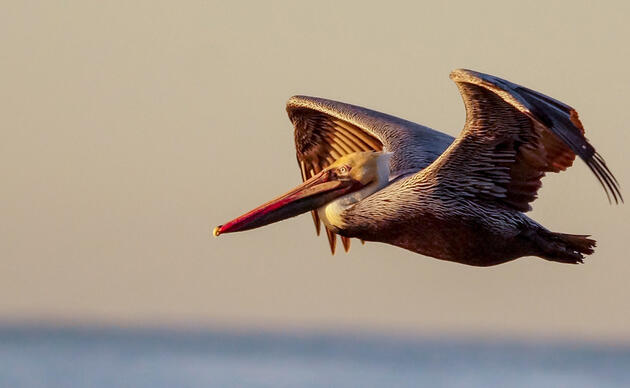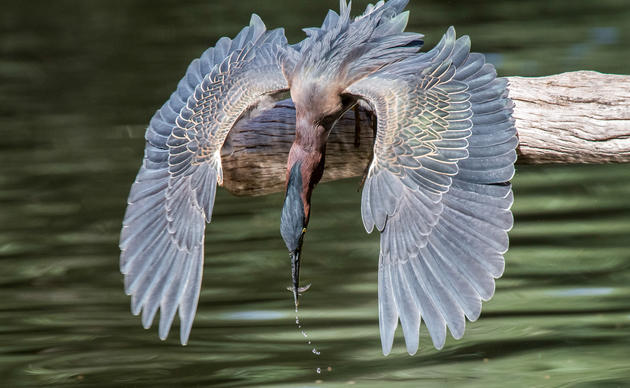This article first appeared in the Charleston Mercury.
This month, Audubon South Carolina, alongside Charleston Animal Society, launches its “Let ‘em Rest, Let ‘em Nest” campaign to educate South Carolina residents and visitors about the fragility and wonder of coastal birds. The campaign is designed to teach the importance of reducing human disturbance to popular beaches and coasts on which declining shorebird species depend.
A unique feature of the campaign is the distribution of free frisbees to beachgoers with dogs, highlighted by the caption “chase this, not birds” to discourage dog owners from allowing their dogs to chase birds or disturb nests. Audubon South Carolina volunteers will begin distributing the frisbees at targeted beaches on Memorial Day Weekend. They are also available at the Charleston Animal Society.
Every year, hundreds of thousands of shorebirds use South Carolina beaches and shores to replenish energy, find food and to hatch their young. Birds seen in coastal areas are usually in the middle of nesting or migration, many flying thousands of miles to reach their destinations. Starting in late February, migrating shorebirds begin to arrive from the south to rest on S.C. shorelines. Beach nesting birds begin their nesting process mid-March.
“It is of utmost importance that we respect the birds during this time. Let’s show them a little Southern hospitality,” says Nolan Schillerstrom, the Coastal Program Coordinator for Audubon South Carolina. “When the birds are on our beaches it’s like a layover when traveling on an airplane — they haven’t reached their destination yet and they are tired, hungry and desperate to rest and refuel.”
Any disturbance to migrating birds during their time spent on the S.C. coast can be life-threatening. Extra strength used to escape or fend off intruders, being chased by dogs or children, or even scarcity of food and habitat can derail a bird’s migration and nesting.
“The best thing we can do is simply to let ‘em rest, and let ‘em nest and give the birds plenty of space so they don’t feel threatened,” Schillerstrom adds. “For these birds, it’s the difference between life and death.”
Audubon South Carolina suggests simple ways you can help protect birds vital to South Carolina’s economy and ecosystem:
One, keep a safe distance (>50 yards) from nesting and resting birds on the beach. If you notice that you are altering their behavior in any way, you are too close. Two, don’t allow children or pets to chase birds. Just because your pet doesn’t “catch” a bird, doesn’t mean the bird isn’t affected. Three, be proactive with responsible dog ownership on the beach: This means following beach rules and keep dogs leashed in specified areas, usually denoted by signage; further, when you see a flock of birds, leash your dog and walk around the flock to minimize disturbance.
Not only do birds add to the quality of life and aesthetics along the coast, their presence supports local economies through tourism. A 2011 report done by the U.S. Fish & Wildlife Service states that S.C wildlife watchers spent $467 million on wildlife-watching activities with over 536,000 people observing birds around the home and on trips in the state.
Birds are great indicators of the environment acting as “winged sentinels” by actively gauging the health of our ecosystems. “Birds alone can’t tell us everything there is to know about ecosystem health, but if there are major problems, we’re going to pick it up through birds,” Schillerstrom adds.
“People usually want to do the right thing and we have found that most people don’t always realize how valuable our coast is to shorebird survival,” says Sharon Richardson, executive director at Audubon South Carolina. “With so much at stake, letting birds rest in peace on the beach is a small act of kindness that can make all the difference for that bird and the entire species.”
The “Let ‘em Rest, Let ‘em Nest” program was created by Audubon South Carolina and the Charleston Animal Society in efforts to decrease human caused disturbance to declining migrating and nesting coastal birds and promote responsible dog ownership on the beach. The campaign aims to educate South Carolinians, along with coastal visitors, on how to create safe spaces for both birds and people. Audubon researchers ultimately hope to protect and increase threatened coastal bird populations along the Atlantic coast.
The Let ‘em Rest, Let ‘em Nest campaign is scheduled to run until March 2018. Visit http://sc.audubon.org/coasts to learn more.



